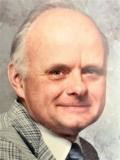In memoriam: Clark Bublitz
Clark Bublitz, a metabolic enzymologist and a member of the American Society for Biochemistry and Molecular Biology since 1963, died Feb. 23. He was 94.

Born Dec. 8, 1927, in Merrill, Wisconsin, he was the son of Clark and Florence Bublitz. He attended the Pillsbury Military Academy in Owatonna, Minnesota, then joined the Army near the end of World War II and was stationed in Rome.
After the war, Bublitz earned a Ph.D. in biochemistry from the University of Chicago, and then he spent a year as a postdoctoral fellow at the Max Plank Institute in Germany where he worked with Feodor Lynen, who later shared the 1964 Nobel Prize in physiology or medicine.
Bublitz joined the faculty at the Johns Hopkins School of Medicine as an assistant professor. While at Hopkins, he met Deborah Keirstead, then a medical student. They were married in 1958. Bublitz spent a year at St. Louis University in Missouri before moving to the University of Colorado Medical Center in Denver, where he remained until his retirement.
Bublitz studied enzymes involved in metabolism in the rat liver, beginning in the 1950s with enzymes that phosphorylate glycerol. He later focused on L-gulonate, a six-carbon metabolite that is an important intermediate between glucose and the pentose phosphate pathway. In the 1960s, collaborating frequently with Albert Lehninger, he studied the conversion of gulonate into ascorbic acid, or vitamin C.
Bublitz was an enthusiastic hiker, tennis player and Green Bay Packers fan. He is survived by his wife, Deborah; five children, Nancy Dyer, Susan Schooleman, Philip Bublitz, Caroline Emsermann and Elizabeth Bublitz, and their spouses; and eight grandchildren.
Enjoy reading ASBMB Today?
Become a member to receive the print edition four times a year and the digital edition monthly.
Learn moreGet the latest from ASBMB Today
Enter your email address, and we’ll send you a weekly email with recent articles, interviews and more.
Latest in People
People highlights or most popular articles

Kiessling wins glycobiology award
She was honored by the Society for Glycobiology for her work on protein–glycan interactions.

2026 ASBMB election results
Meet the new Council members and Nominating Committee member.

Simcox wins SACNAS mentorship award
She was recognized for her sustained excellence in mentorship and was honored at SACNAS’ 2025 National Conference.

From humble beginnings to unlocking lysosomal secrets
Monther Abu–Remaileh will receive the ASBMB’s 2026 Walter A. Shaw Young Investigator Award in Lipid Research at the ASBMB Annual Meeting, March 7-10 in Washington, D.C.

Chemistry meets biology to thwart parasites
Margaret Phillips will receive the Alice and C. C. Wang Award in Molecular Parasitology at the ASBMB Annual Meeting, March 7-10 in Washington, D.C.

ASBMB announces 2026 JBC/Tabor awardees
The seven awardees are first authors of outstanding papers published in 2025 in the Journal of Biological Chemistry.
